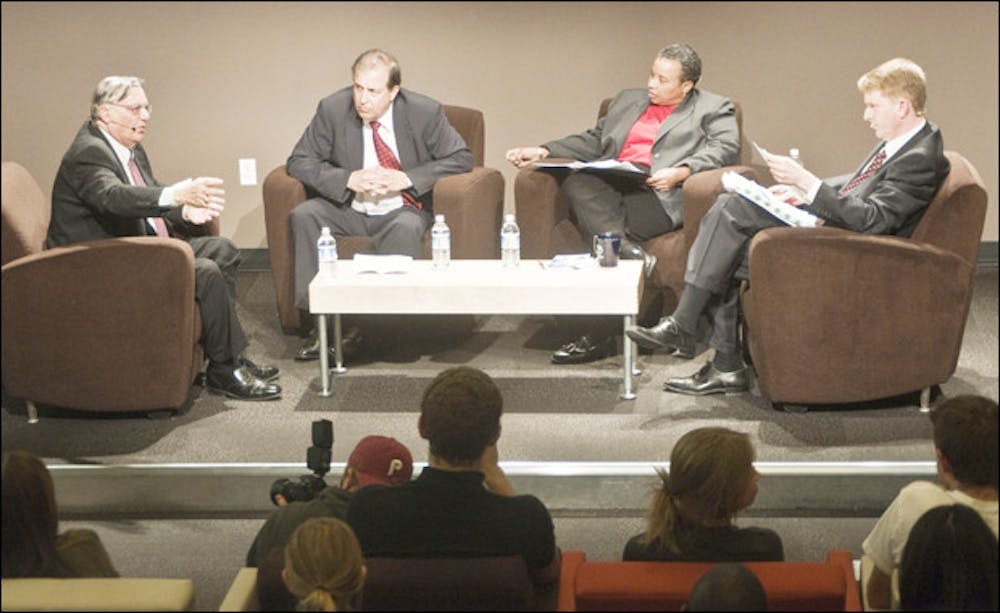Professors from the Walter Cronkite School of Journalism and Mass Communication were forced to cut short a panel interview with Maricopa County Sheriff Joe Arpaio on Monday night when a group of protesters interrupted.
“The border stops brown folks, they cannot cross the line,” the raucous demonstrators sang to the tune of British rock band Queen’s 1975 hit “Bohemian Rhapsody.”
“But it’s easy come, easy go for the rich and their cargo,” the singers continued.
It was a bizarre end to a controversy that engulfed the Cronkite school for nearly a month. Officials from the school were criticized by student groups for inviting the sheriff, who activists accuse of racial profiling with his immigration sweeps.
“I knew it was going to happen,” Arpaio said of the protest after putting on a hat of UA’s mascot, Wilbur the Wildcat, and motioning to the singers.
But immigration was not the topic of the panel, which Dean Chris Callahan called a “Meet the Press”-style interview. Instead, it covered some of Arpaio’s scrapes with the media.
“We’re looking to model for our students how an in-depth interview looks,” Callahan said. “I would like to think our students will learn a lot from … looking at the interactions between the reporters and the sheriff.”
State Press Television
By Daryl Bjoraas and Mallory Kydd
Faculty members Rick Rodriguez, former executive editor of The Sacramento Bee; Sue Green, broadcast news director of Cronkite News Service and former managing editor of ABC15; and Steve Elliot, digital news director of Cronkite News Service and former Associated Press Phoenix bureau chief, asked Arpaio about the accusations from media outlets that he intentionally delayed public records requests and barred certain reporters from entering his press conferences, among other incidents.
There were several tense moments, including a line of questioning concerning an investigation by the Phoenix New Times that culminated in the arrest of the publication’s owners by sheriff’s deputies.
“We are an equal opportunity law enforcement agency,” Arpaio said. “We arrest anyone in violation of the law.”
Arpaio declined to answer the panel’s follow-up questions on the topic, saying only that he was not at liberty to comment any further because of pending legal action.
The tension boiled over when Rodriguez confronted Arpaio about the investigation by the federal government into alleged civil rights abuses stemming from his immigration raids.
Arpaio said he has not been cooperative with authorities because he feels the investigation is politically motivated.
“If there is nothing to hide, why have you chosen not to cooperate in the investigation, even if it is politically motivated?” Rodriguez asked.
Arpaio, after accusing Rodriguez of echoing other media sources, said federal agents showed “unethical conduct” during the course of the investigation. It was then that the singing began.
A shouting match ensued between protesters trying to drown out Arpaio, students who wanted to hear the remainder of the discussion and Dean Callahan, who tried in vain to restore order. One by one, each member of the panel took off his or her headset and exited the stage.
“They didn’t shout down Sheriff Arpaio,” Callahan said of the singing protesters after the panel came to an abrupt end. “They shouted down three top-flight journalists who were trying to question him. My personal opinion? I think that’s dumb.”
The singers included graduate social justice and human rights students Kristy Theilen and Layal Rabat, who said they were frustrated by Arpaio’s attempts to sidestep questions.
“He was dodging the hard-hitting questions,” Rabat said. “He was still doing the same old things, and we weren’t being allowed to ask questions.”
Theilen said she was also disappointed that the Cronkite school did not open the panel up for public questioning.
“This was an opportunity for the students to be heard, and that’s just as legitimate as questions from professional journalists,” she said.
The First Amendment Forum, with a capacity of 210, was not big enough to accommodate the crowd, which spilled out onto the sidewalk in front of the Cronkite building. A large screen showing the event was placed outside the Taylor Place residential hall so students and community members unable to get into the forum could watch the interview.
Banging on drums and burning sage, the protesters sang and chanted slogans like “no racist police, no justice, no peace.”
Among the protesters was Ray Cana, a local coffee shop employee who will play a role in a stage production lampooning Arpaio, which is set to open on Friday. Cana said he agrees that immigration laws need to be enforced but that Arpaio’s department has been unfairly targeting Latinos.
“I think the way he’s going about searching for illegals is wrong,” Cana said. “It’s racial profiling.”
The crowd of protesters was opposed by a group of about 20 Arpaio supporters, which included nursing freshman Megan Kelly. Like most of the demonstrators, Kelly was most concerned about illegal immigration.
“The law is the law. Sheriff Joe is just doing his job,” Kelly said.
Police formed a line between pro- and anti-Arpaio demonstrators outside the building. The First Amendment Forum provided temporary shelter from the ruckus outside, but when the discussion turned to immigration, it took on the same tone as the noisy outdoor protests.
Not all of the anti-Arpaio protesters liked the impromptu musical performance. English literature senior Vanessa Bustos said the song saved Arpaio from having to answer tough questions.
“They were asking very pertinent questions, stuff that should have been asked,” Bustos said of the panel. “To say the least, [the singing] was just childish.”
Reach the reporter at derek.quizon@asu.edu




